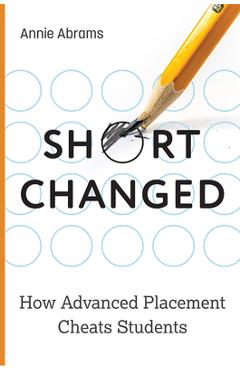
How the College Boards emphasis on standardized testing has led the AP program astray.
Every year, millions of students take Advanced Placement (AP) exams hoping to score enough points to earn college credit and save on their tuition bill.
But are they getting a real college education? The College Board says that AP classes and exams make the AP program more accessible and represent a step forward for educational justice.
But the programs commitment to standardized testing no longer reflects its original promise of delivering meaningful college-level curriculum to high school students.
In Shortchanged , education scholar Annie Abrams uncovers the political and pedagogical traditions that led to the programs development in the 1950s.
In revealing the founders intentions of aligning liberal arts education across high schools and colleges in ways they believed would protect democracy, Abrams questions the collateral damage caused by moving away from this vision.
The AP program is the College Boards greatest source of revenue, yet its financial success belies the founding principles it has abandoned.
Instead of arguing for a wholesale restoration of the program, Shortchanged considers the nations contemporary needs.
Abrams advocates for broader access to the liberal arts through robust public funding of secondary and higher education and a dismantling of the standardized testing regime.
Shortchanged illuminates a better way to offer a quality liberal arts education to high school students while preparing them for college.
I. S. Anderson
126.40 Lei
Gyasmine George-Williams
208.90 Lei
Louisa May Alcott
105.97 Lei
Gertrude Van Duyn Southworth
118.67 Lei
Sean Gladding
128.29 Lei